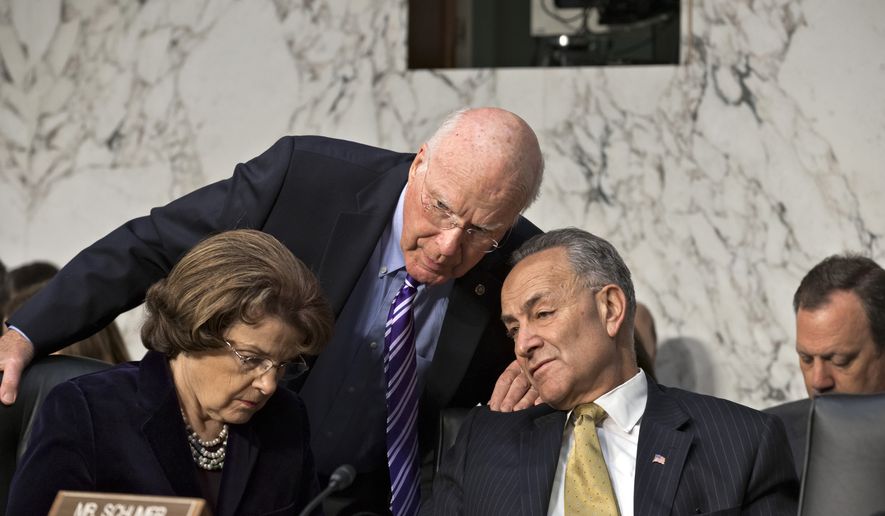Top Democrats pushed back Tuesday against a federal judge’s ruling that the NSA’s phone-records collection program violates privacy rights, asking for higher courts to quickly get involved and bring legal certainty to the murky world of intelligence gathering.
Sen. Dianne Feinstein, California Democrat and chairwoman of the Senate Select Committee on Intelligence, said Judge Richard J. Leon’s decision, released Monday, contradicts a secret intelligence court that has upheld the National Security Agency’s phone program 35 times, and contradicts a federal court in California that said the program doesn’t infringe on privacy.
“There are differing opinions now. That’s the state of play. And the assumption is that it’s going to be appealed and the Supreme Court will eventually make a decision, which is really the appropriate thing,” Mrs. Feinstein said.
But she also said part of the problem is that the administration has been operating the programs on the basis of secret legal memos that it refuses to turn over to Congress, making it difficult for even the lawmakers specifically cleared to oversee the intelligence community to know what is occurring.
Indeed, lack of transparency has become a major issue in the debate over surveillance techniques.
The existence of the NSA’s phone-snooping program and other operations came to light only after former government contractor Edward Snowden leaked details to the press.
Since then, the intelligence community has declassified documents showing it abused the program and even misled the secret court that was designed to approve operations. Still, the judges always signed off on the operations after accepting the government’s argument that the programs were vital to national security.
On Monday, Judge Leon became the first judge to rule against the NSA program, saying that gathering and storing the data likely violates Americans’ privacy rights. He said technology has moved well beyond where it was in the 1970s, when the Supreme Court upheld data-gathering in its Smith v. Maryland ruling.
Judge Leon ordered the NSA to stop collecting information on two plaintiffs in the case before him, though he stayed his own order to give the Obama administration a chance to appeal.
Many members of Congress applauded Judge Leon’s ruling, saying it highlighted an area where the government has overreached.
But Mrs. Feinstein and Senate Majority Leader Harry Reid, Nevada Democrat, said Judge Leon’s decision is an outlier.
The White House was mostly mum, but President Obama’s nominee to be the next top attorney at the CIA, Caroline Krass, said she also disagreed with Judge Leon.
PHOTOS: President Obama's favorite footstool: The famous Resolute desk
“I have a different view about the Fourth Amendment. I think that under Smith versus Maryland, which I still consider to be good law, there is not a reasonable expectation of privacy in telephony metadata,” she said.
Mr. Obama, desperately seeking to preserve the NSA program, met with executives of technology companies Tuesday in an effort to answer their pleas that he rein in excessive data collection.
After a nearly 2-hour meeting with Mr. Obama, a coalition of more than a dozen technology firms — including Google, Yahoo, Apple, Twitter, Facebook and Microsoft — said the administration must reform its data-gathering programs.
“We appreciated the opportunity to share directly with the president our principles on government surveillance that we released last week, and we urge him to move aggressively on reform,” the companies said in a joint statement after the White House meeting.
Mr. Obama created a task force to conduct an internal review. That panel submitted its report to the White House last week, but spokesman Jay Carney said it cannot be made public yet.
“The report, the review group’s report, which has been completed and submitted to the president, will be released publicly. I just don’t have a date for when that will happen. I certainly expect it will be no later than January,” Mr. Carney said.
He said Mr. Obama will speak in January about the status of the program, once he has digested his panel’s findings.
Congress is rushing to fill the void, though lawmakers are moving in two directions.
Mrs. Feinstein’s committee has passed a bill she wrote that puts the NSA phone-records program on firm legal ground, though it would require the agency to do more reporting.
But some conservative Republicans and liberal Democrats have banded together to support a bill that would rewrite the Patriot Act and cancel bulk-records collection.
The chief sponsor in the Senate is President Pro Tempore Patrick J. Leahy, Vermont Democrat and chairman of the Senate Judiciary Committee, who has blasted the scope of the NSA program.
Mr. Reid, who appeared to side with Mrs. Feinstein and disagree with Judge Leon’s ruling, said there should be “a good public debate” on the issue, but he didn’t commit to a time frame in the Senate.
• Stephen Dinan can be reached at sdinan@washingtontimes.com.
• Ben Wolfgang can be reached at bwolfgang@washingtontimes.com.




Please read our comment policy before commenting.